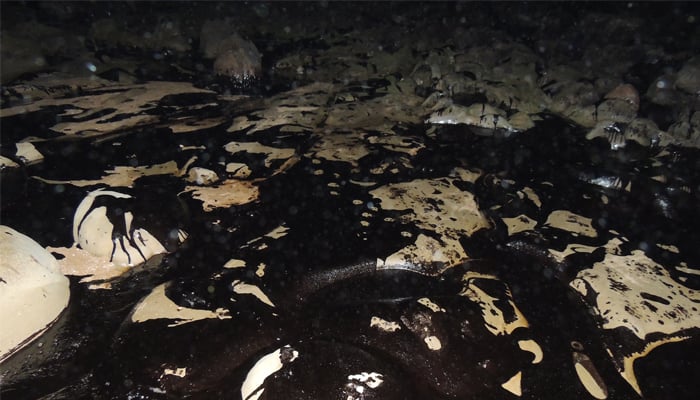WWF-Pakistan expresses serious concerns over oil spill along Karachi coast
World Wide Fund for Nature-Pakistan (WWF-Pakistan) has expressed serious concerns over a major oil spill, which occurred along the coast of Karachi, spreading from Mubbarak village to Manora.
Karachi: World Wide Fund for Nature-Pakistan (WWF-Pakistan) has expressed serious concerns over a major oil spill, which occurred along the coast of Karachi, spreading from Mubbarak village to Manora.
According to local fishermen, a major oil slick was seen near Churna Island on Wednesday, 24 October but its extent and severity did not become apparent until recently.
The oil slick beached on Mubbarak village by Thursday morning and quickly spread up to Sandspit Beach by afternoon. The oil seems to have weathered and has converted to semi-solid tar indicating that it might have released a few days back. The source of this oil spill has, so far, not been ascertained.
The oil spill has now spread over a sizable area and some mortality of animals smeared with oil has been reported from the area. According to WWF-Pakistan’s team who visited Mubbarak village and Sandspit animals covered with oil spill on rocky shore were found dead.
A few dead crabs were also collected and also a number of fishes i.e., eels and croakers, were also found dead on beaches along the Hawksbay. One juvenile green turtle was also found dead on Sandspit Beach.
The impact of the oil spill on other animals, birds and ecosystem has not been determined as yet but it is likely to have serious implications.
According to Muhammad Moazzam Khan, Technical Advisor (Marine Fisheries), WWF-Pakistan, the oil spill can have severe impacts on the marine ecosystem of the area as it has smeared entire rocky beaches covering intertidal rocky platforms and rock pools.
The incidence can lead to mortality of marine animals and plants inhabiting this important ecosystem. He also said that it can also have serious consequences for marine birds if they come in contact with oil as it mostly covers their feathers resulting in mortality.
According to Khan, the oil spill has spread to Churna Island, which is one of the most sensitive habitat along Pakistan’s coast. He also said this island is among a few areas where corals are found and is known to have diverse marine life.
It is possibly the most important diving and snorkelling site along the coast of Pakistan. According to him, cleaning affected beaches of the oil spill is extremely difficult as its physical removal or use of dispersants is not easy.
Dr. Babar Khan, Regional Director, Sindh and Balochistan, WWF-Pakistan, pointed out that teams from WWF-Pakistan are visiting the affected areas and trying to assess the damage that may have caused to the coastal habitat and marine biota.
He pointed out that samples of oil from Mubbarak village and Sandspit have already been collected which will be used for finger printing. Oil fingerprinting is done through Gas Chromatograph (GC–MS) and Spectroscopic (fluorescence, FT-IR) and ultra-high resolution mass spectrometry methods (FT-ICRMS), which will help trace the source of oil pollution.
He also stressed the need for joint efforts to investigate and determine the source of the oil spill, assess its damage and more importantly to initiate a clean-up operation if it becomes feasible.
Oil spills disrupt marine life and have impacts years after a spill occurs. Initially after the spill, oil covers everything from beach sand to rocks at the bottom of the sea, killing most of the marine life. Sea birds, which cannot relocate, get oil on their feathers and cannot maintain their body temperature.
Dolphins and whales also cannot breathe in an oil spill as the oil clogs their blowholes. An oil spill has the worst toll on fish, particularly if the oil comes in contact with fish eggs.
The Tasman Spirit oil spill near Karachi in 2003 is considered as one of the worst environmental disasters in the environmental history of Pakistan wherein, over 33,000 tons of oil spilled into the Arabian Sea and 16 km of the coastline was polluted.
-
Security forces gun down 30 terrorists in multiple IBOs in KP: ISPR
-
MQM-P calls for new province in Sindh
-
US report validates Pakistan military edge over India: PM
-
Banned TTP poses serious threat to Pakistan security: UNSC panel
-
CM Afridi clarifies remarks on by-poll after ECP requests army deployment
-
Dubai sees 3.2m Pakistani passengers in 2025 as airport sets new milestone
-
Security forces kill 23 Indian proxy terrorists in KP's Kurram
-
Pakistan to construct island to boost oil exploration: report













